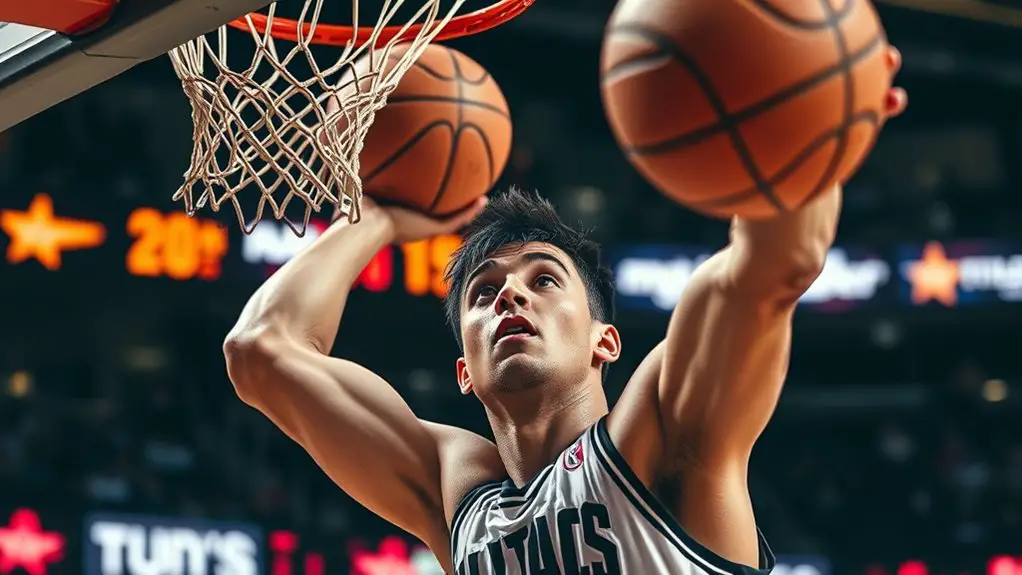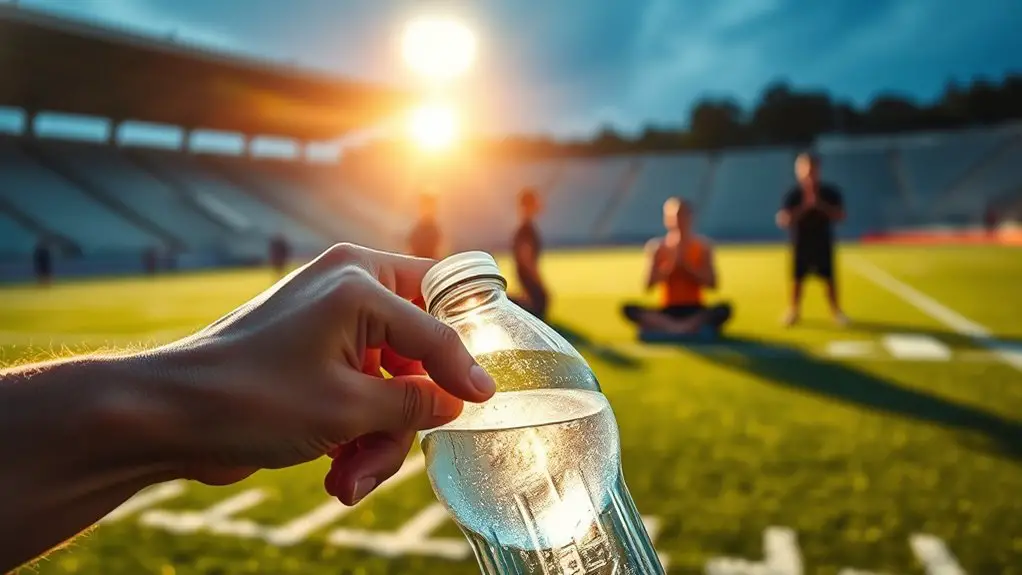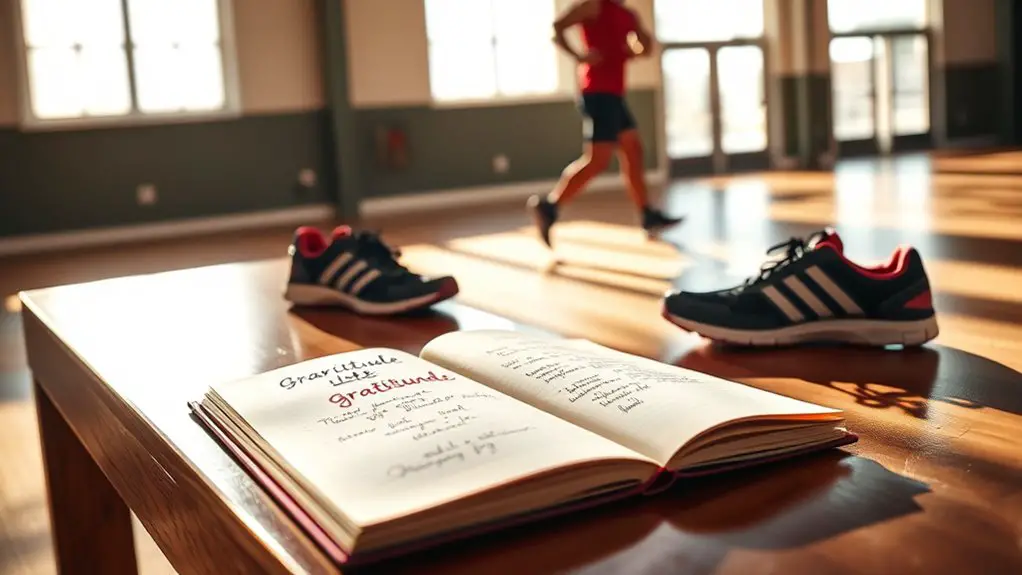The science of clutch performance in sports reveals how pressure can either enhance or hinder your ability to excel. High-stress situations trigger your brain's amygdala and prefrontal cortex, boosting focus and motivation. Experience plays an essential role, as seasoned athletes make quicker and more confident decisions under stress. Mental toughness and visualization can help you thrive during intense moments. Curious about how these factors work together to shape clutch performance? There's more to discover about enhancing your game.
The Psychology of Pressure: How Stress Influences Performance
When athletes face high-pressure situations, the way they respond can make or break their performance. You might feel your heart racing and your palms sweating, and that's completely normal. Stress can either sharpen your focus or cloud your judgment. It's crucial to embrace the pressure and transform it into motivation. Instead of letting anxiety take over, remind yourself of your skills and experiences. Visualize success and trust your training. You've got the ability to break free from self-doubt and channel that energy into something powerful. Remember, the challenge is a chance to shine. By managing stress effectively, you can elevate your performance and enjoy the game, turning those clutch moments into opportunities for greatness.
Neurobiology of Clutch Moments: Brain Activity Under Pressure
As athletes find themselves in crucial moments, their brains undergo remarkable changes that dictate performance. The neurobiology of clutch moments reveals how pressure can enhance or hinder your abilities. Here's what happens:
- Heightened Activation: The amygdala and prefrontal cortex work overtime, increasing focus while managing fear and anxiety.
- Dopamine Release: Under pressure, your brain releases dopamine, boosting motivation and potentially sharpening your skills.
- Cognitive Flexibility: You may experience improved problem-solving and adaptability, allowing you to make split-second decisions.
Understanding these shifts can empower you to harness your brain's power during crunch time. Embracing the science behind your brain's response might just open up your true potential, enabling you to thrive in those pivotal moments.
The Role of Experience: Learning to Perform in High-Stakes Situations
The insights into neurobiology shed light on how the brain reacts under pressure, but experience plays a pivotal role in shaping your performance in high-stakes situations. When you face these moments, your past encounters can guide your decision-making and emotional responses.
| Experience Level | Impact on Performance |
|---|---|
| Novice | High anxiety, poor decision-making |
| Intermediate | Some stress management, moderate performance |
| Experienced | Quick, confident reactions under pressure |
| Elite | Calm focus, superior decision-making |
| Legendary | Mastery, instinctual performance, pressure as opportunity |
As you accumulate experiences, you develop a toolkit that helps you navigate the intensity of clutch moments. Embracing these situations can ultimately lead to personal growth and greater freedom in your gameplay.
Mental Toughness: Building Resilience to Thrive in Tough Times
While many athletes focus on physical training, mental toughness often proves to be the key differentiator in high-pressure situations. Developing resilience allows you to thrive when the stakes are high. Here are three ways to enhance your mental toughness:
Mental toughness is crucial for athletes, enabling them to excel under pressure and embrace challenges with resilience.
- Embrace Challenges: View obstacles as opportunities for growth. This mindset shifts your perspective and fuels your drive.
- Practice Mindfulness: Stay present and aware. Techniques like meditation can calm your mind and help you focus during intense moments.
- Set Clear Goals: Define what you want to achieve, both short-term and long-term. Clear objectives give you direction and motivation, especially when facing adversity.
The Impact of Practice: How Repetition Shapes Performance
When you commit to consistent practice, you're not just repeating movements; you're ingraining skills that can make a significant difference in performance. Each time you practice, you're building muscle memory, which allows you to perform under pressure without overthinking. This freedom to act instinctively can be your greatest asset in clutch situations. As you refine your technique, you'll notice increased confidence and a deeper connection to your sport. Embracing repetition helps you push past limitations and discover new levels of potential. So, whether it's shooting hoops or perfecting your swing, remember that every rep brings you closer to mastery. With dedication, you'll not only enhance your skills but also unveil the freedom to express your true athletic self when it matters most.
Visualization Techniques: Preparing the Mind for Success
Success in sports often hinges not just on physical ability, but also on mental preparation. Visualization techniques can help you tap into your potential, paving the way for clutch performance. Here are three effective methods to get you started:
- Imagery: Picture yourself succeeding in specific scenarios. This mental rehearsal can boost confidence and reduce anxiety.
- Positive Affirmations: Repeat empowering phrases that resonate with your goals. This reinforces a winning mindset and keeps negativity at bay.
- Goal Setting: Set clear, achievable goals. Visualizing these milestones makes them feel tangible and fuels your motivation.
The Influence of Team Dynamics: Support Systems in Clutch Situations
In clutch situations, the strength of team dynamics can make all the difference between victory and defeat. When the pressure's on, having a solid support system is essential. You need teammates who believe in you, ready to lift you up and share the burden. Trust and communication become your lifelines; they help you stay focused and grounded. A supportive environment fosters confidence, allowing you to take risks and push your limits. When everyone's on the same page, you tap into a collective energy that can drive your performance to new heights. Remember, it's not just about individual skill; it's about how you connect and collaborate. Embrace that synergy, and you'll find your team thrives in those intense moments.
Genetic Factors: Are Some Athletes Born to Perform Under Pressure?
How much of an athlete's ability to perform under pressure is determined by genetics? While mental toughness and skill development are vital, some athletes might indeed be born with traits that give them an edge in high-stakes situations. Here are three genetic factors that can influence clutch performance:
- Stress Response: Some individuals have a more resilient physiological response to stress, allowing them to stay calm when the pressure's on.
- Fast-Twitch Muscle Fibers: A higher proportion of these fibers can enhance explosiveness and speed, essential for peak performance in clutch moments.
- Cognitive Function: Genetic predispositions can affect decision-making and reaction times, enabling athletes to make split-second choices under pressure.
These factors suggest that while hard work matters, genetics can play a significant role in clutch performance.
Frequently Asked Questions
How Do Athletes Cope With Failure After Clutch Moments?
When you face failure after a clutch moment, it's crucial to embrace the experience. Reflect on what went wrong, learn from it, and remember that every setback can fuel your growth and future success.
What Role Does Coaching Play in Clutch Performance?
When you're in the heat of the moment, coaching's like having a trusty sidekick. They guide you through pressure, offering strategies and support, helping you find your focus and confidence to seize those vital opportunities.
Are There Specific Sports Where Clutch Performance Is More Critical?
In sports like basketball and football, clutch performance's essential. You'll see athletes shine under pressure, making game-winning plays. Those moments define careers, so mastering that pressure can elevate your competitive edge greatly.
How Do Fan Reactions Affect Athlete Performance in Clutch Situations?
Fan reactions can really impact your performance in clutch situations. When you're cheered on, it boosts your confidence, but negative reactions can add pressure. Finding a balance helps you thrive under those intense moments.
Can Diet or Nutrition Influence Clutch Performance?
Sure, diet and nutrition can definitely influence your clutch performance. When you fuel your body with the right nutrients, you'll enhance energy levels, focus, and recovery, all essential for delivering under pressure when it counts.




